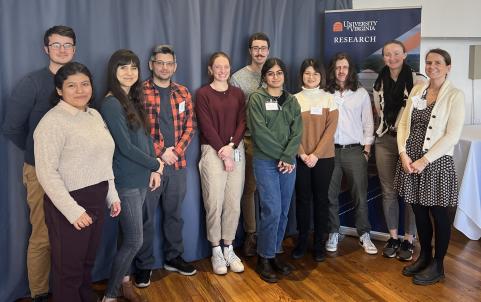2024 Presidential Fellows Application

Applications for our 2024 fellows cohort are currently under review.
The Provost’s Office, in collaboration with the UVA Brain Institute, is proud to announce another round of the presidential graduate fellowship program to promote cross-grounds collaborative neuroscience research. To this end, we seek to bring together neuroscientists from different divisions and Schools to tackle important questions and perform transformative work that will enhance our research enterprise. Proposed projects should be student-led with guidance by at least two mentors and may be on any subject related to neuroscience. Evidence of prior collaboration is not required, and the creation of new partnerships is encouraged.
Submitted proposals should provide evidence that a 3rd or 4th year graduate student will be jointly guided in a collaborative, multidisciplinary environment on a synergistic project with the potential to generate transformative science. The fellowship will cover a standard annual stipend ($36,500) for living support, tuition, fees, and health for one year. The standard stipend will be provided to all awardees regardless of school, while the cost of tuition, fees, and health insurance will vary per school rates. Fellowship awards are not eligible for renewal. Projects that are currently receiving or have within the last two years received Brain Institute support are not eligible for additional funding. Fellows should be 3rd or 4th year graduate students during the award period.
Awarded fellows will be asked to participate in Brain Institute events and, with the support of the mentors, provide a final report and talk at the completion of the fellowship term. Awarded fellows and their mentors must also submit an individual fellowship proposal to an external funding organization (e.g., NIH F30/F31/F99/K grant, NSF PRFB, Ford Foundation, or other similar grants from other external agencies) within six months of completion of the fellowship term. Mentors are also expected to participate in future review of program applications.
Proposal Components:
- Mentors
- Biographical Sketches should highlight the specific expertise that each mentor and mentee bring to the project. Mentor biosketches should include (1) a section on training record, and (2) a list of students the mentor has graduated and their respective publications.
- Jointly written recommendation letter and mentorship plan (4 pages maximum).
- Mentor(s) and Nominee
- Title of project.
- Project Overview and Specific Aims (1 page).
- 1 paragraph description of each mentor’s research program.
- 1 paragraph addressing the following questions:
- Why does the project require a collaborative approach?
- How does the combination of collaborators or disciplines (if applicable) enable science that the individuals could not accomplish alone?
- How does this project have the potential to enhance UVA’s neuroscience research enterprise?
- 1 paragraph describing plans to submit an external individual fellowship application including expected timeline and agency.
- Student Biosketch.
- Course Grades.
Proposal Submission Format:
- Please use 11-point Arial or Helvetica font and 1-inch margins.
- Assemble entire application as one PDF titled: “Lastname_Firstname_2024PFCN.pdf”
- Submit using our online application form.
- Deadline: Friday, March 15, 2024 (11:59pm EDT)
- Final award announcements will be made at the beginning of May.
Criteria for Evaluation:
- Alignment with RFA: transformative, collaborative, multidisciplinary.
- Benefit to student.
Review Process
Each application will have three reviewers:
- Within school/unit with expertise closely aligned with project.
- Outside school/unit reviewer with expertise closely aligned with project.
- Reviewer with general neuroscience expertise.
Each reviewer will use the rubric below and be asked to write a short summary with the strengths and weaknesses of the application.
Scoring Rubric for Reviewers:
Please score each category below from 1-9 (with 1 being the best, NIH style). Try to spread the score as much as possible. Write a very short summary statement with the pros and cons of the application (bullet points are acceptable). An anonymous summary of the reviews will be provided back to the applicants.
Score categories include:
- Significance:
Does the project address an important problem or a critical barrier to progress in the field? If the aims of the project are achieved, how will scientific knowledge, technical capability, and/or clinical practice be improved? How will successful completion of the aims change the concepts, methods, technologies, treatments, services, or preventative interventions that drive this field?
- Approach:
Are the overall strategy, methodology, and analyses well-explained and appropriate to accomplish the specific aims of the project? Are potential problems, alternative strategies, and benchmarks for success presented?
- Innovation:
Does the application challenge the current research or clinical practice paradigms by utilizing novel theoretical concepts, approaches or methodologies, instrumentation, or interventions? Are the concepts, approaches or methodologies, instrumentation, or interventions novel to one field of research or novel in a broader sense? Is refinement, improvement, or new application of theoretical concepts, approaches or methodologies, instrumentation, or interventions proposed?
- Collaboration and mentorship:
- Does the project require a collaborative approach?
- Are the mentors well-suited to the project?
- Does combination of mentors or disciplines enable studies that the student could not accomplish alone?
- Is the training plan well-described and sufficient to ensure student's success?